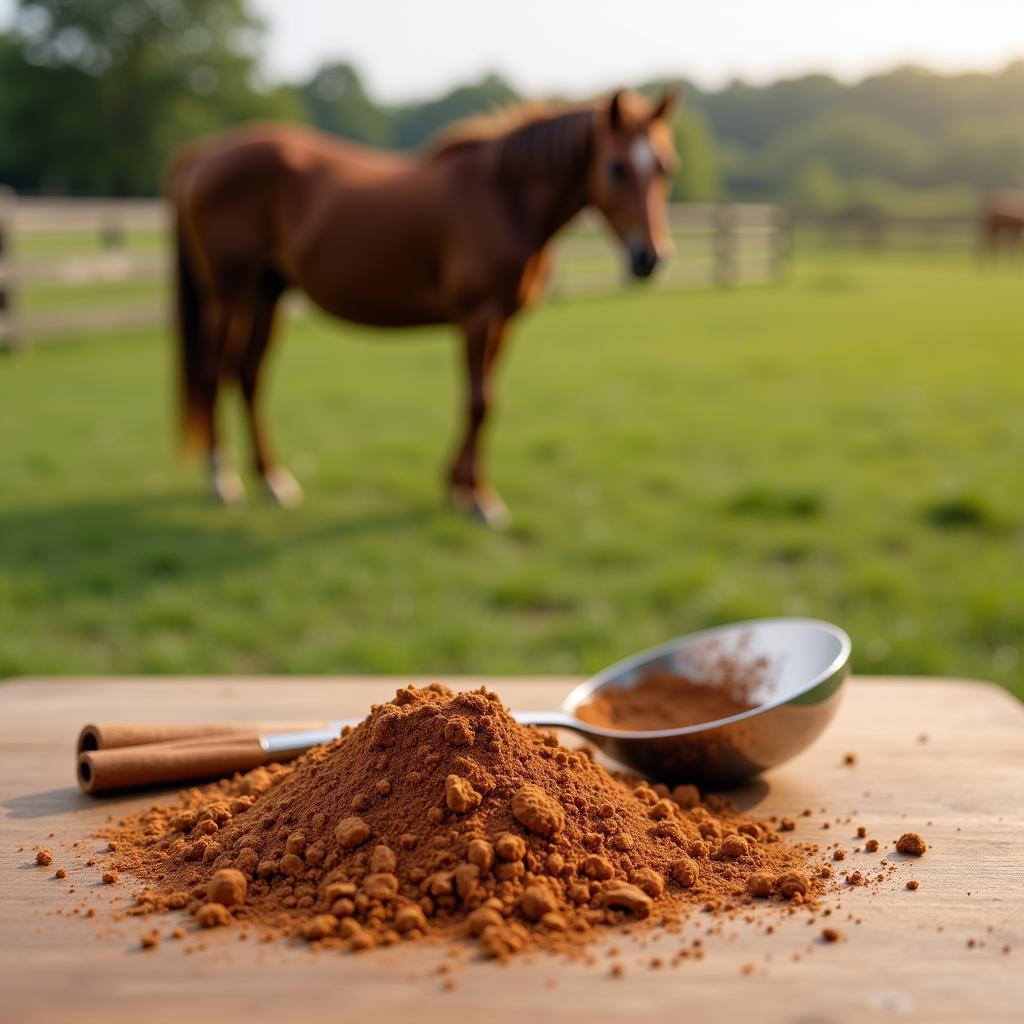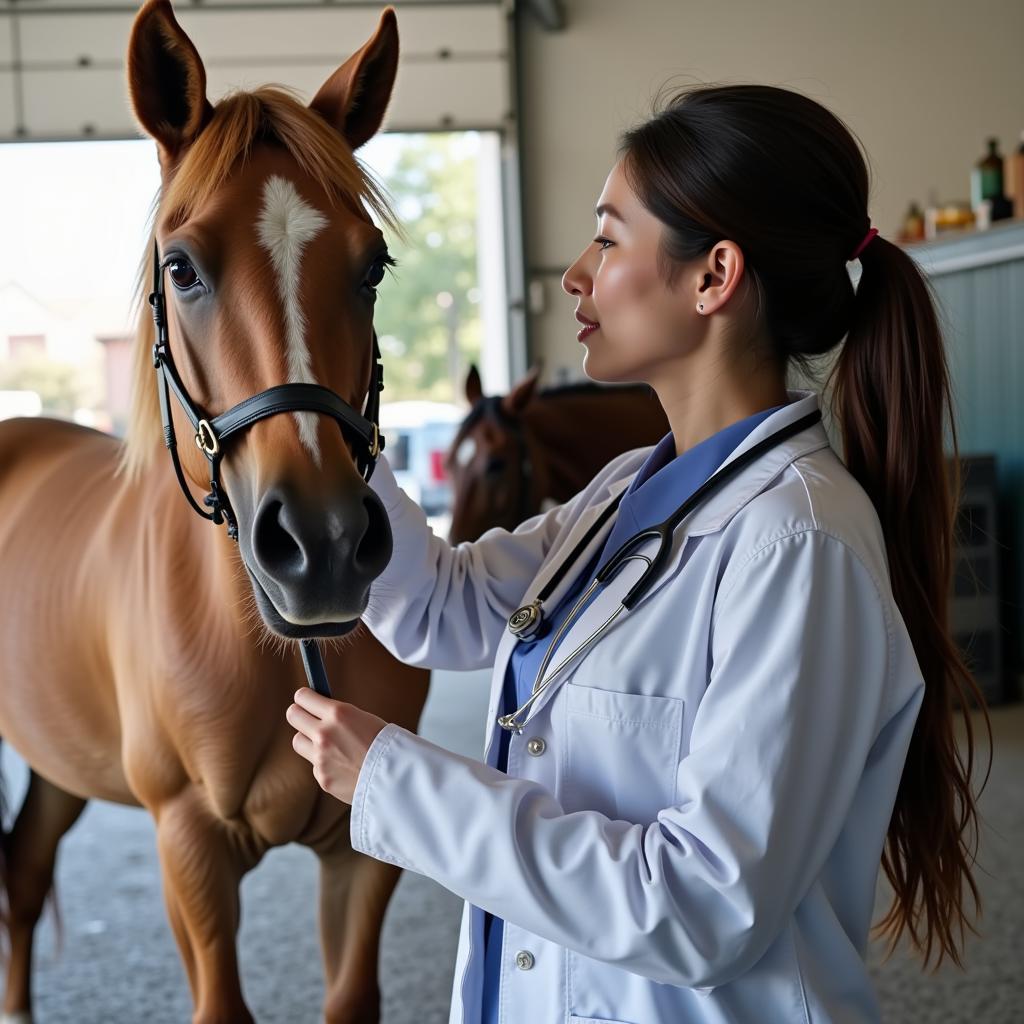Cinnamon, a spice often associated with cozy autumn treats, has piqued the interest of horse owners for its potential health benefits. But can horses eat cinnamon? This comprehensive guide delves into the uses, benefits, and risks of Cinnamon For Horses, providing you with the knowledge you need to make informed decisions about incorporating this spice into your horse’s diet. After reading this guide, you’ll understand the role cinnamon can play in equine health.
Can Horses Have Cinnamon? Understanding the Benefits and Risks
Cinnamon, derived from the bark of cinnamon trees, contains several compounds, notably cinnamaldehyde, which contributes to its distinct aroma and potential health benefits. While horses can consume cinnamon in moderation, it’s crucial to understand both the potential advantages and risks associated with its use.
The Potential Benefits of Cinnamon for Horses
Several anecdotal accounts and preliminary studies suggest cinnamon may offer various benefits for horses:
- Insulin Sensitivity: Cinnamon might help improve insulin sensitivity, potentially beneficial for horses prone to insulin resistance or Equine Metabolic Syndrome (EMS).
- Anti-inflammatory Properties: The anti-inflammatory properties of cinnamon may help soothe sore joints and muscles in horses.
- Antioxidant Effects: Cinnamon’s antioxidant properties could contribute to overall cellular health.
- Appetite Stimulation: In some cases, cinnamon has been observed to stimulate appetite in horses experiencing a decrease in feed intake.
- Digestive Support: Some horse owners believe cinnamon can aid digestion, though scientific evidence in horses is limited.
 Cinnamon Powder for Horses
Cinnamon Powder for Horses
Risks and Considerations When Using Cinnamon for Horses
While cinnamon can offer potential benefits, it’s essential to use it cautiously:
- Dosage: The appropriate dosage of cinnamon for horses is still under research. It’s vital to start with small amounts and monitor your horse for any adverse reactions.
- Allergic Reactions: Some horses may be allergic to cinnamon. Introduce it gradually and watch for signs of allergy, such as skin irritation or respiratory distress.
- Drug Interactions: Cinnamon can potentially interact with certain medications. Consult your veterinarian before adding cinnamon to your horse’s diet, especially if they are on any other medications.
- Quality: Use high-quality, pure cinnamon powder or sticks. Avoid products containing added sugars or artificial flavors.
- Long-Term Effects: The long-term effects of cinnamon supplementation in horses are not fully understood. Further research is needed to determine its safety and efficacy over extended periods.
If you’re thinking about baking a special treat for your equine companion, check out our horse birthday cake for horse recipe for some inspiration!
Incorporating Cinnamon into Your Horse’s Diet
If you decide to add cinnamon to your horse’s diet, do so gradually and in moderation. You can mix a small amount of cinnamon powder into their feed. Another option is to add cinnamon sticks to their hay.
Is Cinnamon Good for Horses with Cushing’s Disease?
While some believe cinnamon may benefit horses with Cushing’s disease due to its potential impact on insulin regulation, there’s limited scientific evidence to support this claim. Consult with your veterinarian before using cinnamon for horses with Cushing’s disease.
Want to learn more about creating nutritious and delicious meals for your horse? Check out our horse mash recipe!
What Are the Signs of Cinnamon Allergy in Horses?
Signs of a cinnamon allergy in horses can include hives, itching, swelling, difficulty breathing, and digestive upset. If you notice any of these symptoms after introducing cinnamon, discontinue its use immediately and contact your veterinarian.
Looking for a unique gift for the horse lover in your life? Consider a horse scented candle!
Conclusion
Cinnamon holds potential benefits for horses, but its use should be approached with caution. Always consult with your veterinarian before adding cinnamon or any other supplement to your horse’s diet. By doing so, you can ensure your horse’s safety and well-being while exploring the potential advantages of this intriguing spice. Looking for more treat ideas for your horse? Check out our German molasses horse muffins recipe.
FAQ
- Can I give my horse cinnamon sticks? Yes, you can offer cinnamon sticks in moderation.
- How much cinnamon can I give my horse? Consult your veterinarian for the appropriate dosage.
- What are the benefits of cinnamon for horses? Potential benefits include improved insulin sensitivity and anti-inflammatory effects.
- Can cinnamon cure Cushing’s disease in horses? No, there is no evidence to support this claim.
- Are there any risks associated with feeding cinnamon to horses? Yes, potential risks include allergic reactions and drug interactions.
- What should I do if my horse has an allergic reaction to cinnamon? Discontinue use immediately and contact your veterinarian.
- Where can I buy high-quality cinnamon for my horse? Look for pure cinnamon powder or sticks from reputable suppliers.
 Veterinarian Examining a Horse
Veterinarian Examining a Horse
Other Questions We Get Asked
- What are the best ways to introduce cinnamon into my horse’s diet?
- Are there specific types of cinnamon that are better for horses?
- How can I tell if the cinnamon I’m using is high quality?
For more information on horse care and nutrition, explore our other articles on Christmas horse names.
When in need of assistance, please don’t hesitate to contact us.
Phone: 0772127271
Email: [email protected]
Address: QGM2+WX2, Vị Trung, Vị Thuỷ, Hậu Giang, Việt Nam.
We have a 24/7 customer service team ready to help.